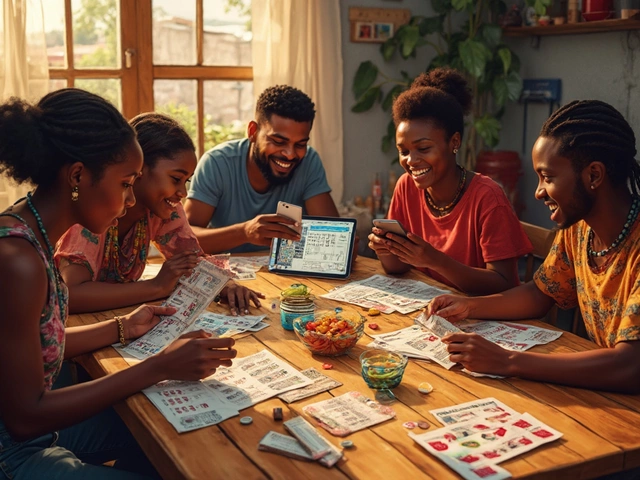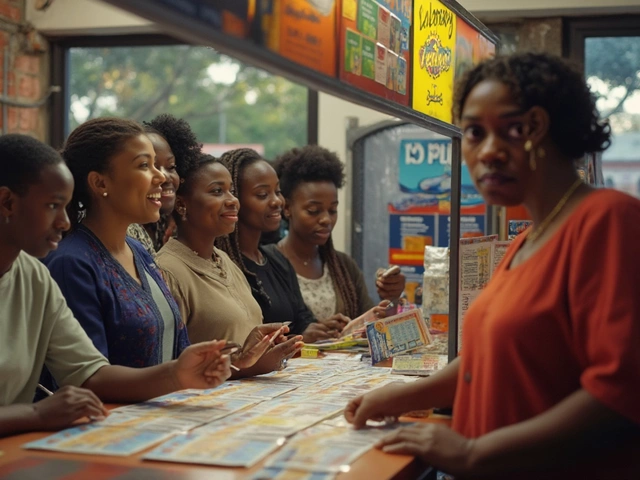
If you’ve ever daydreamed about splitting a massive lottery jackpot with your mates, you’re not alone. A lottery syndicate might sound like something fancy, but it’s really just a group of people who pool their cash to buy more tickets together. It’s a simple idea that can make playing the national lottery or big games like EuroMillions feel even more exciting—and actually improve your chance of winning something.
The best part? You don’t have to figure it all out on your own. Setting up a syndicate can be as easy as getting a few buddies together, agreeing on the rules, and tracking your tickets. I’ve seen groups from office lunch clubs to extended families team up, and while you reduce the price per player, you boost the ticket count. That means a better shot at those thrilling lotto results—and if you do win, the celebration gets to be shared (just remember: the prize gets split, too).
- What’s a Lottery Syndicate, Anyway?
- How Syndicates Boost Your Odds
- Setting Up Your Own Syndicate
- Managing Money and Splitting Prizes
- Famous Syndicate Stories and What They Teach
- Play Responsibly—Keep It Fun
What’s a Lottery Syndicate, Anyway?
A lottery syndicate is simply a group of people who join forces to buy lottery tickets together. Instead of one person buying a few lines on their own, everyone chips in a bit of money to buy a much bigger batch of tickets as a team. This means you’ve got your fingers in a lot more pies—without blowing your weekly budget. Each member owns a piece of every ticket, so if any ticket in the group hits a prize, the group gets to split whatever’s won. The most important thing? Every syndicate member has a fair claim on every ticket, whether you win a fiver or hit a life-changing jackpot.
Syndicates aren’t new in the world of the national lottery—they’ve been around since the early years when the main draw launched back in 1994. The National Lottery operator even says that roughly 1 in 5 jackpot wins involves a syndicate. People form them with friends, family, or even workmates. In some cases, online services can connect you with strangers, but most folks like to stick with people they trust.
Here’s why syndicates are so popular:
- You get to boost your odds of winning, as a group can afford more tickets than any one person might want to buy.
- Winning feels extra special when you get to celebrate with friends, not just keep it to yourself.
- If you’re looking for regular play, pooling resources helps everyone save a little cash each week.
Just remember: however the syndicate is set up, everyone needs to agree on how tickets are bought, prizes shared, and who’s in charge of organising. All it takes is a little trust and good communication—plus written rules or a simple agreement, so there are no awkward arguments if you’re lucky enough to land a big win.
How Syndicates Boost Your Odds
This is where things get real. Joining a lottery syndicate means you and your group are basically putting more tickets into the draw without spending a ton of extra money. The logic is simple: more tickets = more chances. If you’re playing the national lottery by yourself and buy one ticket, you’re up against those tough odds on your own. But say you’ve got 10 people in your syndicate, each chipping in for a ticket—that’s 10 shots at the jackpot and every prize tier below it.
Let’s look at some real odds for context. For the main National Lottery Lotto game, the odds of matching all six main numbers to win the jackpot are about 1 in 45 million. Not great when you’re solo. But if your syndicate pools for 20 lines a week, here’s how your group’s odds stack up compared to playing alone:
| Number of Tickets | Jackpot Odds per Draw | Total Cost (at £2 each) |
|---|---|---|
| 1 (solo) | 1 in 45,057,474 | £2 |
| 10 (small syndicate) | 1 in 4,505,747 | £20 |
| 20 (larger syndicate) | 1 in 2,252,873 | £40 |
That means with 20 tickets in a syndicate, your group’s odds of hitting the jackpot are 20 times better than going solo for the same draw. You’re still playing a long game, but that bump in probability makes group play way more appealing.
Now, the catch: any winnings get split up between all the syndicate members. So if a ten-person office syndicate wins £1 million, each person walks away with £100,000. Not the full pot, but still life-changing—and much more likely than with a single ticket.
Syndicates sweep up small wins too, especially when playing across multiple games like Thunderball or Set For Life. Those little wins can add up or even cover the next round of tickets. Plus, syndicates often score a few wins in the lower prize tiers most weeks, which solo players might miss out on.
Long story short: more tickets, better odds, and a shot at celebrating together. That’s what turns a group syndicate into a smart play for anyone chasing those big lotto results.
Setting Up Your Own Syndicate
So you want to get your own lottery syndicate rolling? Start small and keep it clear. All you really need are a few trusted people (friends, family, coworkers) and an easy way to keep track of money and tickets.
First, decide how many folks are in and set a regular buy-in amount. For example, everyone could chip in £2 each draw, or maybe more if you’re all feeling lucky. The bigger the group and the more tickets you buy, the better your odds—but remember, each win gets split between everyone.
Here’s how to keep things simple and fair:
- Agree on the Rules: Write down how much each person pays, which games you’ll play (like the National Lottery, EuroMillions, or Thunderball), and how to split all winnings—even smaller prizes. No handshake deals; jot it down somewhere everyone can see it.
- Pick a Syndicate Manager: Choose someone to buy the tickets, collect cash, and keep records. This person’s also in charge of sharing updates or lotto results after every draw.
- Share Proof: After buying tickets, snap a pic or scan for the group. That way, everyone knows what numbers you’ve got before the draw.
- Track Contributions and Wins: Use a simple spreadsheet or even a group chat to keep tabs on payments and winnings for full transparency.
- Decide What Happens with Winnings: Will you split every win straight away or roll smaller wins into future ticket purchases?
The National Lottery’s official website even offers printable syndicate agreements for free. Grab one at national-lottery.com/syndicates to keep things official. It covers who’s playing, buy-in amounts, ticket-buying plans, and what to do if someone wants out of the group.
| Syndicate Size | Average Tickets per Draw | Typical Win Sharing |
|---|---|---|
| 4 friends | 8 | Each gets 25% |
| 10 coworkers | 20 | Each gets 10% |
| 25 family members | 25 | Each gets 4% |
The more organized you are, the fewer headaches later on. Syndicates that last are open, honest, and make sure everyone’s on the same page about tickets, payments, and prize splits. If you want, you can even use the National Lottery app to check numbers and keep a digital record for the whole group.

Managing Money and Splitting Prizes
This is where things can get awkward—or super straightforward. With a lottery syndicate, you really want your money stuff nailed down from the start. The last thing you want is to win and then argue over who paid what or how much everyone should get.
Here’s what works: set up a clear system before you ever buy your first ticket. Most groups go for one of these approaches:
- One person collects and buys: Everyone hands their share to one trusted person (maybe on payday). This person buys the national lottery tickets and keeps a record—snapping photos of tickets helps if you’re old school, but with the national lottery app, you can share screenshots directly. Don't mix syndicate cash with your own money to avoid headaches.
- Bank transfer or pooled account: Open a dedicated online account just for the group, so there’s always a clear money trail. Handy for bigger or long-term syndicates where folks might not meet often in person.
Put it all in writing—even if it’s an email thread or a shared doc. Write down who’s in, how much each person pays each week, and what happens if someone misses out one week. Some groups have a short agreement, which covers:
- Who collects the cash
- How tickets will be bought (in-store, national lottery app, or website)
- How prizes (even the small ones) get split
- What to do with leftover pennies—roll into the next draw or treat yourselves to snacks?
Say the syndicate wins. The way you split the winnings will depend on the shares. Most do it evenly, but maybe someone puts in for two shares each week—make sure the math’s fair. For big wins, the national lottery will usually pay out directly to the group’s account, or to the ticket holder who then shares it around. Keep proof of who played, how much they paid, and everything else for your own records.
Here’s a quick comparison of common prize splitting methods:
| Splitting Method | How It Works | Best For |
|---|---|---|
| Even Split | Each member pays the same, each takes the same share | Small groups, office teams |
| Proportional Split | Shares based on exact amount contributed each draw | Drop-in/out players, families with different budgets |
Avoid cash drama by keeping communication open. Agree on everything up front, put it in writing, and make sure everyone understands the plan before the first lotto results roll in. If you ever win big, having your syndicate paperwork ready makes life way easier when you’re claiming those national lottery prizes. That way, the only thing left to argue about is where you’ll celebrate your win (and maybe how to split a pizza).
Famous Syndicate Stories and What They Teach
Syndicates aren’t just for the hopeful or the small-time player—they’ve landed some of the biggest wins in UK lottery history. Let’s check out a few standout stories and see what we can learn from them.
Back in 2011, a group of 12 bus drivers from Corby became national headlines after their syndicate hit the EuroMillions jackpot, pocketing £38 million. Each member took home over £3 million. Their secret? Total trust. They kept careful records and always paid in on time, so there was no drama when the big win finally happened.
Another famous win happened in 2012 when a group of IT workers at Hewlett-Packard in Liverpool scooped a £45.5 million EuroMillions jackpot. With so many people involved, dividing the money fairly and sticking to the written syndicate agreement saved a lot of potential headaches. Imagine trying to split the cash after the fact if you hadn't set clear rules!
For a bit of diversity, look at the Suffolk catering staff who netted £148 million in 2012. They played together regularly and used the national lottery app to organize their tickets and track their entry fees. They went public, shared how they planned to use the winnings (lots for charity!), and made sure everyone got their share quickly thanks to good planning.
Here's a quick look at some big UK syndicate wins:
| Year | Group | Jackpot Won | Number of Winners |
|---|---|---|---|
| 2011 | Corby Bus Drivers | £38 million | 12 |
| 2012 | HP IT Team (Liverpool) | £45.5 million | 12 |
| 2012 | Suffolk Catering Staff | £148 million | 3 |
What do all these stories have in common? Organization and transparency. Every winning syndicate kept clear records, had written rules, and agreed on how to split the pot from the start. If you’re thinking of setting up your own, don’t skip this step—it can save friendships and avoid awkward fallouts. If there’s a big win, you’ll be glad you acted like the pros.
Play Responsibly—Keep It Fun
There’s nothing wrong with getting a group together and buying more tickets, but the fun goes out the window if people get carried away. The number one thing with any lottery syndicate is to stick to a budget—one you’re comfortable with, and one everyone in the syndicate agrees on upfront. It’s just too easy to get caught up in that 'just one more ticket' feeling, especially if you’ve had a near miss or heard about someone else scooping a jackpot.
Here’s a quick look at how much Brits typically spend on the lottery:
| Average Weekly Spend (per adult) | Source |
|---|---|
| £3.96 | NHS Digital (England, 2023) |
If you play with others, agree on the max you’ll each chip in per week or month—no exceptions. If anyone feels uncomfortable about the amount, talk it over before money changes hands. It’s always better to have those honest chats upfront than fallout later.
And remember, syndicates are supposed to be fun. If someone wants to leave, or needs to take a break, make it easy for them and don’t pressure anyone to stick around. If you ever find the fun’s gone and you’re playing just for the sake of it, it might be time to step back for a bit.
If you’re using the national lottery app or buying tickets online, consider setting spend limits. The app has built-in tools so you can control the amount you play each week, and you can get reminders about how much you’ve spent.
Lastly, don’t chase lost tickets or try to win back losses—winners are rare and the lottery is random. If you or someone in your syndicate is worried about gambling habits, GamCare and BeGambleAware offer free, confidential support. Playing together should bring mates closer, not stress anyone out.





Write a comment